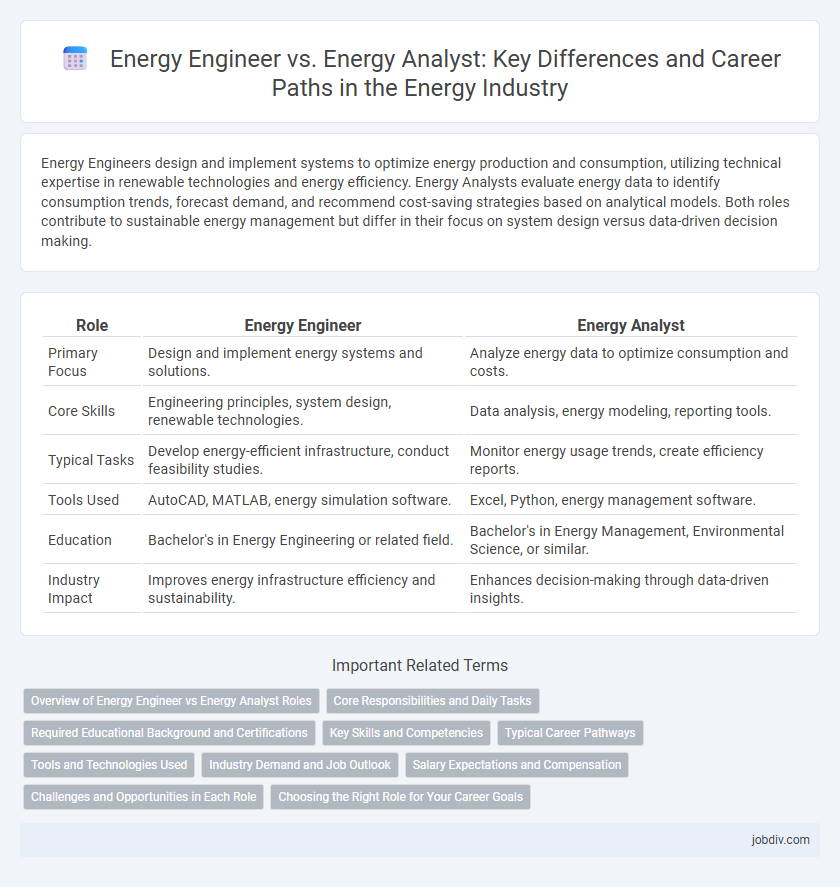Energy Engineers design and implement systems to optimize energy production and consumption, utilizing technical expertise in renewable technologies and energy efficiency. Energy Analysts evaluate energy data to identify consumption trends, forecast demand, and recommend cost-saving strategies based on analytical models. Both roles contribute to sustainable energy management but differ in their focus on system design versus data-driven decision making.
Table of Comparison
| Role | Energy Engineer | Energy Analyst |
|---|---|---|
| Primary Focus | Design and implement energy systems and solutions. | Analyze energy data to optimize consumption and costs. |
| Core Skills | Engineering principles, system design, renewable technologies. | Data analysis, energy modeling, reporting tools. |
| Typical Tasks | Develop energy-efficient infrastructure, conduct feasibility studies. | Monitor energy usage trends, create efficiency reports. |
| Tools Used | AutoCAD, MATLAB, energy simulation software. | Excel, Python, energy management software. |
| Education | Bachelor's in Energy Engineering or related field. | Bachelor's in Energy Management, Environmental Science, or similar. |
| Industry Impact | Improves energy infrastructure efficiency and sustainability. | Enhances decision-making through data-driven insights. |
Overview of Energy Engineer vs Energy Analyst Roles
Energy Engineers design and implement systems to improve energy efficiency, focusing on technical solutions such as HVAC, renewable energy integration, and sustainable building practices. Energy Analysts evaluate energy data, conduct audits, and develop forecasts to optimize energy consumption and reduce costs through data-driven strategies. Both roles collaborate to enhance energy performance but differ in their emphasis on technical design versus data analysis.
Core Responsibilities and Daily Tasks
Energy Engineers focus on designing, developing, and implementing energy-efficient systems and renewable energy technologies, ensuring optimal energy performance in buildings and industrial processes. Energy Analysts specialize in data collection, energy consumption modeling, and cost-benefit analysis to identify energy-saving opportunities and support strategic decision-making. Both roles contribute to energy management, but engineers emphasize technical system design while analysts prioritize data-driven evaluations and reporting.
Required Educational Background and Certifications
Energy Engineers typically require a bachelor's degree in engineering disciplines such as mechanical, electrical, or environmental engineering, often supplemented by certifications like Professional Engineer (PE) or Certified Energy Manager (CEM). Energy Analysts usually hold degrees in energy management, environmental science, or finance, with certifications including Certified Energy Auditor (CEA) or Leadership in Energy and Environmental Design (LEED) accreditation. Both roles benefit from specialized training in energy systems, sustainability practices, and regulatory compliance to enhance expertise and employability in the energy sector.
Key Skills and Competencies
Energy Engineers specialize in designing and implementing energy systems, leveraging expertise in thermodynamics, renewable energy technologies, and energy efficiency optimization. Energy Analysts focus on data collection, energy consumption modeling, and cost-benefit analysis to identify opportunities for energy savings and sustainability improvements. Both roles require proficiency in software tools like MATLAB, AutoCAD, and energy management systems, but Energy Engineers emphasize technical design skills, while Energy Analysts excel in statistical analysis and reporting.
Typical Career Pathways
Energy Engineers often begin their careers with a degree in engineering, progressing from roles in design and implementation of energy systems to senior technical positions or project management. Energy Analysts typically start with a background in data analysis or environmental science, advancing by specializing in energy modeling, policy assessment, or strategic consulting within energy markets. Both career paths offer opportunities to transition into leadership roles focused on sustainability, energy efficiency, and renewable energy development.
Tools and Technologies Used
Energy Engineers utilize advanced simulation software such as AutoCAD, MATLAB, and EnergyPlus to design and optimize energy systems, integrating renewable technologies and managing HVAC and power distribution frameworks. Energy Analysts employ data analytics platforms like Excel, Python, and specialized energy management systems (EMS) to analyze consumption patterns, forecast demand, and generate actionable reports for energy efficiency improvements. Both roles leverage building information modeling (BIM) and Internet of Things (IoT) sensors to enhance energy monitoring and performance optimization.
Industry Demand and Job Outlook
Energy engineers focus on designing and implementing systems for efficient energy production and management, driving high demand in renewable energy sectors such as solar and wind power. Energy analysts specialize in data evaluation and market trends to optimize energy consumption and costs, with growing opportunities in sustainability consulting and regulatory compliance. The job outlook for both roles is strong, fueled by increasing investments in clean energy infrastructure and government policies targeting carbon reduction.
Salary Expectations and Compensation
Energy Engineers typically earn higher salaries than Energy Analysts due to their specialized technical expertise in designing and implementing energy systems, with average compensation ranging from $75,000 to $110,000 annually. Energy Analysts, who primarily focus on data analysis, energy consumption trends, and financial modeling, have salaries averaging between $60,000 and $85,000 per year. Salary expectations for both roles vary significantly based on experience, location, and industry sector, but Energy Engineers consistently receive higher compensation due to their direct impact on infrastructure and efficiency improvements.
Challenges and Opportunities in Each Role
Energy Engineers face challenges in designing and implementing efficient systems to reduce energy consumption while meeting sustainability standards, yet they have opportunities to innovate with renewable technologies and smart grid integration. Energy Analysts encounter difficulties in interpreting complex data sets and forecasting energy trends but benefit from advancements in data analytics and the growing demand for energy optimization strategies. Both roles require adapting to evolving regulations and technological disruptions, creating pathways for collaboration and specialized expertise in the energy sector.
Choosing the Right Role for Your Career Goals
Energy engineers design and implement systems to improve energy efficiency, focusing on technical innovation and project management, which suits professionals interested in hands-on engineering work. Energy analysts concentrate on data interpretation, market trends, and policy impact analysis, ideal for those who enjoy research and strategic planning in the energy sector. Selecting the right role depends on whether your career goals align more with technical design and innovation or data-driven decision-making and policy evaluation.
Energy Engineer vs Energy Analyst Infographic

 jobdiv.com
jobdiv.com